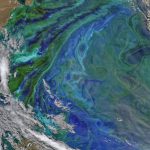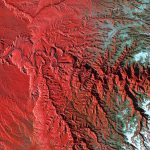 August 3, 2020 5:05 pm
Published by Climate Extremes
August 3, 2020 5:05 pm
Published by Climate Extremes
Northwest of Svalbard, north of Norway, an area known as Whalers Bay stays ice‐free in winter despite the negative air temperatures. It has been assumed that this open water is maintained by inflow of warm Atlantic Water along Svalbard’s west coast; however, this mechanism has never been demonstrated quantitatively -till now.
 August 3, 2020 4:48 pm
Published by Climate Extremes
August 3, 2020 4:48 pm
Published by Climate Extremes
CLEX researchers used real-world observations with satellite observations to calculate the quantity of nutrients carried into the Subantarctic Zone by mesoscale eddies. They found these eddies carried high nitrate and low silicate waters into the Subantarctic Zone.
 July 29, 2020 11:52 am
Published by Climate Extremes
July 29, 2020 11:52 am
Published by Climate Extremes
Climate change will affect prescribed burning days in the future. Unexpectedly, it is not all bad news, but as the coming century progresses there are definitely changes ahead for our firefighters in Australia when it comes to preparing for a fire season, especially along the east coast of Australia.
 July 29, 2020 11:40 am
Published by Climate Extremes
July 29, 2020 11:40 am
Published by Climate Extremes
CLEX researchers and colleagues have highlighted the need for the development of systems to predict marine heatwaves, which are a growing threat to marine ecosystems and industries as the climate changes.
 July 24, 2020 1:10 pm
Published by Climate Extremes
July 24, 2020 1:10 pm
Published by Climate Extremes
CLEX researchers addressed the error compensation issue for temperature extremes by defining a novel performance metric that identifies those models that can simulate temperature extremes well and simulate them well for the right reasons.
 July 22, 2020 11:02 am
Published by Climate Extremes
July 22, 2020 11:02 am
Published by Climate Extremes
Tiny microbes at the base of the ocean food chain will be increasingly affected by marine heatwaves as the climate changes.
 July 22, 2020 12:38 am
Published by Climate Extremes
July 22, 2020 12:38 am
Published by Climate Extremes
The most advanced and comprehensive analysis of climate sensitivity yet undertaken has revealed with more confidence than ever before how sensitive the Earth’s climate is to carbon dioxide. The range has been reduced from 1.5°C-4.5°C down to 2.3°C-4.5°C.
 July 10, 2020 1:10 pm
Published by Climate Extremes
July 10, 2020 1:10 pm
Published by Climate Extremes
Ocean salinity could be an indicator of major rain events before IOD or ENSO events have peaked. This raises the prospect that long term forecasts for Australia could be improved by analysing sea surface salinity in the Indian and Pacific oceans.
 July 9, 2020 9:59 am
Published by Climate Extremes
July 9, 2020 9:59 am
Published by Climate Extremes
In this paper, CLEX researchers developed new metrics to assess whether forecaster edits targeting these processes were reducing error in the daily varying component of the wind forecasts, by comparing edited and unedited forecast data with weather station observations.
 July 3, 2020 3:53 pm
Published by Climate Extremes
July 3, 2020 3:53 pm
Published by Climate Extremes
A new paper by Martin Jucker and colleagues reveals the choice of a particular convection-resolving model (CRM) has a much larger impact on the results than increasing resolution. It also suggests the behaviour of CRMs is tied to model internals instead of the phenomena they are trying to reproduce.










